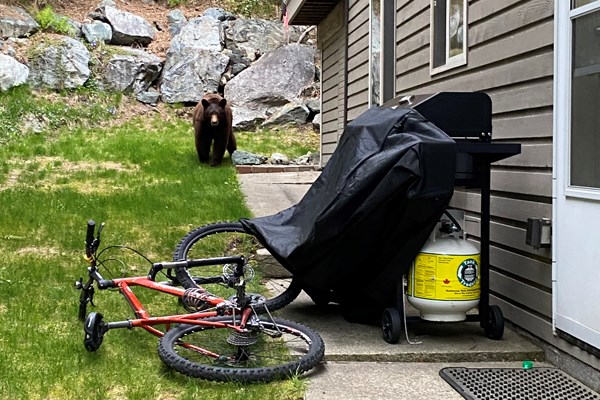Just because the temperature has turned doesn’t mean we are out of the woods yet!
is reminding 麻豆社国产residents to remain bear aware.
As bears prepare for hibernation — during which they can lose up to 30% of their bodyweight — they are currently in a period called hyperphagia from August until November. Hyperphagia is extreme eating, and they may consume over 20,000 calories daily.
As a result, bears will be active throughout the day and night and may forage around 17 hours per day. They will be highly food motivated and may linger in the 麻豆社国产community if they have access to easy calories from garbage, pet food, barbecues, bird seed, fruit trees, berry bushes, compost, livestock, and fruit or vegetable gardens.
To help deter bears, and keep them and us safer, residents can use the following tactics:
- Ensure garbage and recyclables are stored inside until collection day.
- If there is no indoor space, then use a bear-resistant container.
- Odorous items like meat scraps or food leftovers can be frozen until collection day
- Feed pets indoors.
- Keep livestock feed indoors and in a secure container.
- Keep barbecues clean.
- Do not use bird feeders until the winter.
- Harvest fruit and berries or add an electric fence surrounding the tree or bushes.
- Secure fruit and vegetable gardens, beehives, chickens or other livestock with electric fencing.
- Maintain an odour-free compost.
Bears will remember food sources, so if a neighbourhood becomes known as a source, they are likely to return each year.
For those who will be actively using forest trails and the backcountry, keep in mind the following tips:
- Assume you will encounter wildlife.
- Watch for bear signs like scat, tracks, claw or bite marks on trees, overturned logs, and rocks where bears have looked for insects.
- Obey signage warning of wildlife activity or trail closures.
- Travel in groups, if possible, and talk, sing or clap your hands. Bear bells are not known to be effective.
- Be aware of your surroundings, and do not use headphones when hiking, biking or running in bear country.
- Keep dogs on a leash.
- Carry bear spray and know how to use it and transport it safely.
- Immediately leave if you find a carcass and notify the Conservation Officer Service.
If you encounter a bear, stop, remain calm and slowly back away while talking to the bear. Do not turn your back, and have bear spray ready. To learn more about how to recreate safely in bear country, then use WildSafeBC’s online course at .
Lastly, it is important to report sightings and bear conflicts to the Conservation Officer Service at 1-877-952-7277, especially before a bear becomes food-conditioned.

